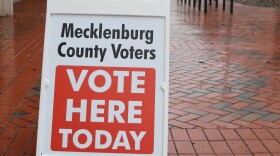Toniqua Bailey and her five children, all ages nine and younger, live in a three-bedroom apartment in East Durham. Earlier this summer, on a warm day, the older kids played outside before coming inside to cool down.
Bailey’s apartment has air conditioning, but it tends to break down a lot. She recently paid $300 out of pocket to get it fixed. That’s expensive for her budget, but she said it was too hot for the kids.
"It got up to 86 (degrees) in here, so it was real hot and muggy," said Bailey, describing management at her apartment complex as unreliable. "When I stayed in (another) unit, they ... never got no AC in there. No one ever came to fix it. So basically, before they switched me to this unit, I went a whole year without AC. (It was) miserable."
Extreme heat fueled by climate change is expected to make this year one of the hottest on record. Heat is the number one weather-related killer across the U.S.
So far this summer, North Carolina health officials have reported over 4,600 heat-related emergency room visits — on track to surpass last summer’s visits.
To deal with the heat, many consider air conditioning a necessity. But in North Carolina, landlords are not required to provide air conditioning. Cooling standards could help address this issue.
What are cooling standards? Why are they important?
According to state law, landlords have to maintain existing AC units, but they’re not required to provide those units to begin with.
This is because cooling ordinances do not exist anywhere in North Carolina. Cooling ordinances are local or state laws that require landlords to provide AC during the summer, similar to how landlords are already required to provide heating during the winter.

"We didn't want people freezing to death in their houses, so we made heating standards," said Ashley Ward, director of the Heat Policy Innovation Hub at Duke University. "They mandate a minimum indoor temperature during winter. All we're asking for is what we already do for cold weather ... we also do it for hot weather."
It’s hard to know exactly how many people in North Carolina don’t have air conditioning because the data is spotty, according to Ward. However, there is data on energy poverty, which highlights how expensive it is to use fans or window units instead of a centralized AC system.
"I think people would be surprised to learn that there are folks in eastern North Carolina whose monthly energy bill during the summer is $800," Ward said. "When I was working in eastern North Carolina, it was not unusual to hear people talk about rationing their energy use. They would put their thermostat to 85 degrees in the house so that they could afford to buy medicine or food."
Ward argues passing a cooling ordinance would help make air conditioning more affordable and accessible to the people who need it most, usually lower income communities of color.
A proposed statewide cooling standard died in committee
Earlier this year, Rep. Tracy Clark, D-Guilford, introduced legislation that would have required landlords to provide AC during warm weather conditions.
"This in my mind is a no brainer," Clarke said. "If a state law requires heat, it should thus also require AC because it’s not just a comfort element. It’s an actual health element."
The bill died in committee, but it's likely the first of its kind to be introduced at the General Assembly. It only received support from other Democratic lawmakers. Clarke said she'll work on getting bipartisan support in the next session, although she expects pushback from lobbying groups.
What to know about cooling ordinances
- They require landlords to provide air conditioning to renters during the summer to protect against the heat, similar to how landlords are required to provide heating during the winter to protect against the cold.
- They are not widely adopted. The state of Arizona has a statewide cooling standard, along with at least 17 other cities and counties across the country – including the cities of Chicago, Dallas and New Orleans.
- Passing a cooling ordinance would help make air conditioning more affordable and accessible to the people who need it most, usually lower income communities of color.
- A statewide cooling standard was proposed during the General Assembly’s legislative session this year. The bill died in committee.
- There’s discourse over whether local governments in NC have the power to pass their own cooling standard. They could risk it and pass one anyway, but they would likely be fined and face legal challenges.
But across the country, other states and local municipalities have adopted cooling ordinances. For example, in the state of Arizona, landlords must provide a rental unit that has fully operating cooling systems that make it safe to occupy.
In the city of Dallas, TX, landlords must provide and maintain AC "capable of maintaining a room temperature of at least 15 degrees cooler than the outside temperature, but in no event higher than 85°F in each habitable room." For a more comprehensive list of existing cooling standards across the country, click here.
Could a local government pass their own cooling standard? It's complicated
North Carolina has a unique system of power between the state government and local governments. Local governments can only act within certain powers given to them by the state.
Rebecca Fisher-Gabbard, assistant professor at UNC’s School of Government, explained there's discourse and disagreement on whether or not local governments have the authority to pass their own cooling standard.

The main issue is determining legislative intent: When the state legislature enacted the landlord-tenant law, did they act in a comprehensive and complete regulatory scheme to exclude local government regulation about any or all landlord tenant issues?
Some argue yes — the state retains authority on habitability, meaning local governments don't have the power to pass a cooling ordinance.
"(In North Carolina) municipalities and other local governments are generally precluded from legislating in an area unless given explicit permission from the state," said Durham City Council member Chelsea Cook. "In terms of habitability, the state has already legislated so, not only have they not given us permission to legislate, but they have clearly retained this area as one governed by the state legislature."
However, others have a different interpretation. According to information provided by Rep. Pricey Harrison, D-Guilford, there's "nothing in the statutes that would preempt a local government from (requiring that owners of rental properties install air conditioning), and the local government could likely do so under either the general police power as regulating conditions detrimental to health and safety, or as a development regulation under Chapter 160D."
Another factor to consider: State law says landlords must "make all repairs and do whatever is necessary to put and keep the premises in a fit and habitable condition."
"Does a lack of cooling or air conditioning in 100 plus degree weather constitute a fit premise?," said Fisher-Gabbard.
"If a state law requires heat, it should thus also require AC because it’s not just a comfort element. It’s an actual health element."Rep. Tracy Clark, D-Guilford
In theory, a local government could pass their own cooling standard and challenge the state's authority, but doing so would come with plenty of risk.
"There are real consequences for acting beyond their delegated authority," said Fisher-Gabbard, noting that those consequences would not necessarily be automatic. "(This could cost) tens and hundreds of thousands of dollars, if a local government has been found to have acted beyond the scope of their authority."
Orange County chairwoman Jamezetta Bedford said in an email to WUNC that this issue has not been raised in recent years.
"We will have to check if the NC General Assembly allows counties or towns to pass such an ordinance. If it is allowed, then we would need to consider the cost (and) benefits of doing this," said Bedford. "There is a shortage of landlords renting at affordable rates throughout the county. In the meantime, there are fans for eligible seniors available if needed."
Other local officials WUNC spoke to echoed the same sentiment of wanting to focus on tangible services they can provide, like giving fans to vulnerable communities or helping low-income families pay expensive energy bills.
Editor's Note: This story has been updated to provide additional context about the risk local government could face for acting beyond their authority.







